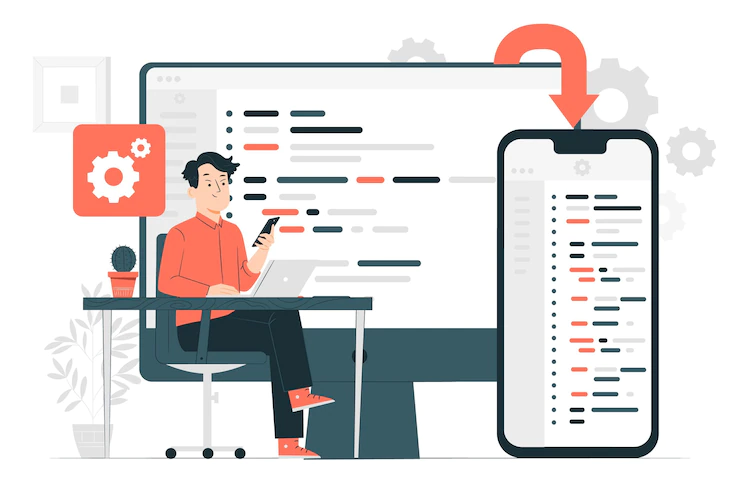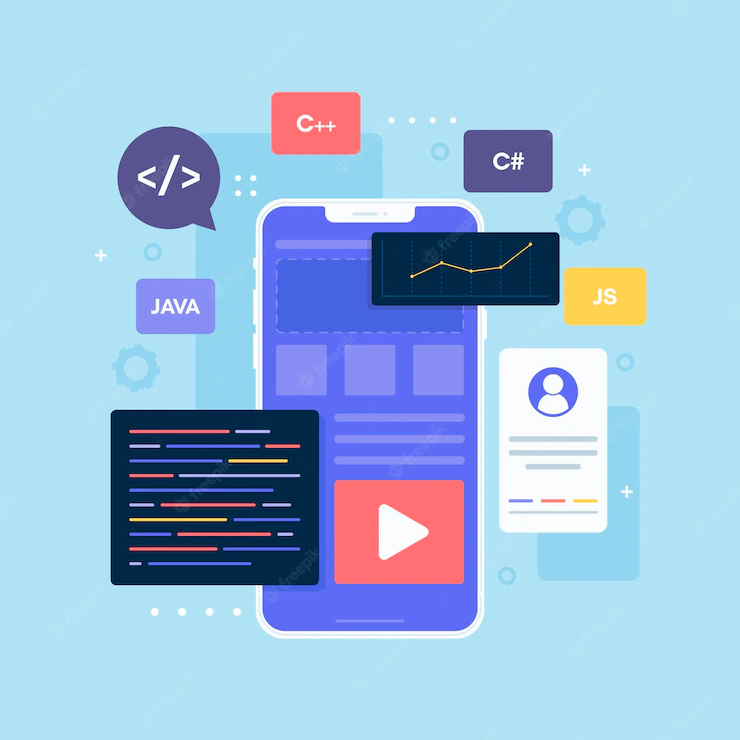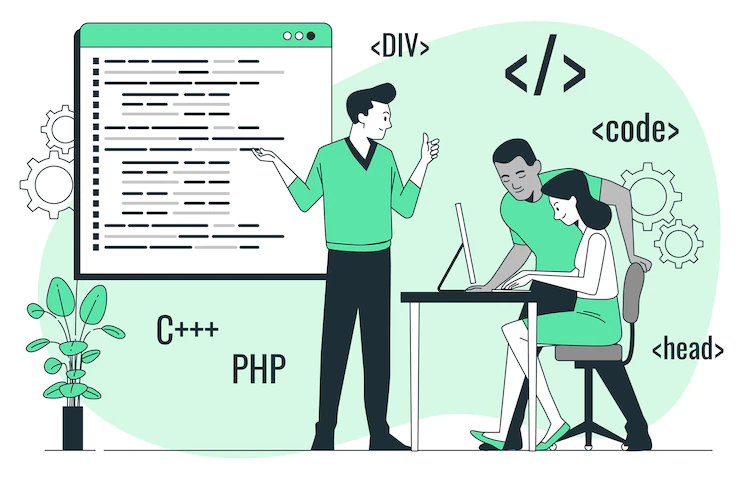Cross platform development has gained popularity among different companies seeking to increase customer engagement and remain competitive in a tight consumer market. As more people acquire mobile phones and smart devices, companies strive to deliver innovative solutions using standalone applications and cloud solutions. Flutter is among the popular cross platform development frameworks in the market.
What is Flutter cross platform development? Why is it popular, and how does it work? Flutter is a fast-growing open-source software promising to revolutionize mobile and web app development. This blog post explores the ins and outs of Flutter cross platform development. The article also provides crucial guidance for developers looking to expand their technical skills.

Flutter is essentials for cross platform UI optimization
What is cross platform development?
Before delving into the technical aspects of Flutter, we should understand what cross platform development involves. Cross-platform development is synonymous with software development. It is a process that involves building mobile applications that can run reliably on multiple operating systems. These apps work on iOS, Android and Windows platforms. Companies can update cross platform applications on different devices and operating systems simultaneously.
Cross platform development has several advantages, including the possibility of reaching more users with a single app, reducing development costs and enabling companies to enjoy higher returns on investment. Cross platform development also ensures consistent UI UX design across mobile and web platforms. Companies and developers have access to several software development kits for creating cross platform applications.
Do you have a physical product or mobile app idea you want to launch?
What is Flutter?
It is hard to mention cross platform development without mentioning Flutter. It is a relatively new mobile app development framework from Google. Flutter is used for:
- Android app development
- iOS app development
- Windows app development
Initially, the framework supported app development for Android and iOS platforms. However, with recent improvements, the framework is critical for developing web apps, Linux and Google Fuschia.
Flutter cross platform development has gained popularity for its fast app development cycles and versatility of apps for different platforms. The developer creates a single codebase and deploys it to native platforms like Android and iOS. The developers optimize the codebase for consumers to enjoy consistent user experiences across devices and platforms.
Flutter has a unique widget toolkit to enhance the quality of mobile applications developed using the framework. It also uses the Skia Graphics library for UI rendering. The set of widgets used in Flutter cross platform development is unique and does not depend upon the UIs of different mobile platforms. There are two categories of widgets used for Flutter cross platform development. They are:
- Material Design widgets targeting Android app development.
- Cupertino widgets for iOS app development
The framework uses Dart programming language. It is a unique programming language that facilitates direct communication between the applications and the native platforms. Dart is an ahead-of-time (AOT) programming language and allows software developers to build complex yet highly responsive apps with remarkable performances.
Flutter cross platform development has several benefits that are customer and developer-sided. The open-source standard development kit (SDK) is important for creating apps with a native feel and look targeting iOS, Android and Windows devices using a single codebase. Flutter supports third-party plugins that developers can utilize to enhance the functionality and effectiveness of mobile apps.
How Flutter Works
Flutter cross platform development is not as complex as it sounds. Anyone with a programming background can leverage several development tools provided by Flutter to expedite app development. Flutter uses a unique model to build apps compared to the other cross platform development frameworks.
In standard cross platform development frameworks, the developer writes code in a higher-level language before translating it into a lower-level language that the native operating system understands.
In Flutter cross platform development, developers generate all the programming code once. As the developer writes application code, Flutter’s tools analyze the mobile or web app user interfaces (UI) and generate functional code for Android, iOS, web, and Windows(following the latest updates that made Flutter stable for Windows app development).
Flutter uses dynamic compilation for code generation targeting different platforms at once. Dynamic code compilation is achieved using the Dart virtual machine.

Dart is an Object oriented programming language similar to Java and C#
Dynamic code compilation in Flutter depends on just-in-time code execution. App instructions are generated as the program executes.
Although dynamic code generation is not new, Flutter builds on the shortcomings of other frameworks. The dynamic code compilation is faster since program execution is completed in a virtual machine. The virtual machine executes specific instructions for particular devices and platforms.
Flutter cross platform development eliminates the need to write application code in a higher-level language and translate it into a lower-level language for it to run on specific platforms. The developers focus on optimizing app performances instead of resolving issues due to inconsistencies arising when two different sets of instructions are used to run the same code on two diverse devices.
Flutter cross platform development takes advantage of the ‘hot reload’ feature. The unique Flutter architecture allows developers to modify application code as the program runs. Changes to the source code can reflect immediately without the need to reboot or restart the application. It makes it easy for developers to maintain and update applications over time. They add features without rewriting the entire application code.
Do you have a physical product or mobile app idea you want to launch?
Benefits of Flutter Cross Platform Development
The software development space is dynamic and experiences new changes daily. Companies and freelance developers must always stay abreast with changes in the tech space and consumer behaviors. It is no surprise that Flutter cross platform development is a popular topic among experienced and aspiring software development teams. Everyone is focused on delivering high-quality products within a short time and at a lower cost. It implies developers must optimize every app development stage. That is conceptualization, wireframe development, coding, testing and lifetime support. Flutter cross platform development addresses most challenges faced by the modern-day software developer. Let us look at the benefits of Flutter.
Facilitates faster app development
Flutter cross platform development is faster thanks to the framework’s robust analytical tools and simplified widgets. The developer writes a single code and uses Flutter tools to compile and generate functional codes for different application systems. Developers spend less time coding since they have access to pre-defined functions.
Flutter hot reload function means developers can infuse changes to the base code faster without affecting the structure of the original code. Software development is dynamic, and developers implement several changes before releasing the final app. Implementation of these changes is done without the need to rewrite entire blocks of code.
Easy to learn and use
As mentioned earlier, Flutter cross platform development uses Dart programming language. Anyone with a background in object-oriented programming languages should not face difficulty shifting to Dart and the Flutter framework. Code structures and syntax for Dart are closely similar to Python, Java and C#. Developers with little coding experience can use widgets to minimize coding.
Google offers comprehensive documentation regarding Flutter cross platform development. Novice app developers can utilize online documentation to learn the basics of Flutter and build their first apps.
Simple scalability
Developers should ensure they build scalable apps that can support future upgrades and version updates. In Flutter cross platform development, the framework depends upon Google’s Firebase for backend functionalities. Firebase ensures the end-users enjoy real-time database management and synchronization. The customers can enjoy software updates while the application maintains optimal performance.
Consistent user experiences across platforms
Flutter cross-platform development ensures customers enjoy consistent user experiences. Flutter is a dependable framework to help you build native apps. Developers using the framework can create attractive, detailed and functional user interfaces that resonate with customer requirements.
Through Flutter cross platform development, users can develop complex interfaces containing several components that are not only attractive but also highly responsive. Flutter focuses on optimal app functionality.
Drawbacks Flutter cross platform development
Despite its advantages, Flutter has some drawbacks making it unsuitable for some developers. It is a relatively new framework, and some developers shun it with concerns over technical support to resolve bugs and other development issues.
Since Flutter is a cross platform framework, the developer needs to understand how different mobile platforms or operating systems work. However, some developers are dedicated to developing apps for specific platforms. The developer should understand basic code structures for Java, Swift and other languages used to build iOS, Windows and Android applications. Here are some cons of Flutter cross platform development that developers and software development agencies should be aware of.
Flutter apps are large
Most developers have raised concerns over the large sizes of Flutter apps. The code required to execute the application is contained in the program package. In short, the mobile application is self-contained. In native app development, the application depends on the operating system elements to execute program code. It reduces the size of the app. When the mobile or web app is large, the probability of encountering usability issues increases with particular devices.
iOS app functionality concerns
Flutter was developed by Google and was intended to enhance Android app development. With a few tweaks here and there, the framework can handle app development for different frameworks. There are a few reports of iOS devices lagging or exhibiting lower performance than their Android counterparts. However, Flutter developers and the online community are working to fix reported issues and optimize the framework for all platforms.
Learning Flutter Cross Platform Development
Cross platform development is gaining traction in different industries. Each company wants to expand customer reach and control software development expenses. The demand for cross platform app development will maintain an upward trend. Developers should gain knowledge of different cross platform frameworks and acquaint themselves with several programming languages. It will enhance their earnings and expose them to better opportunities in the software development space.

Several avenues exist for developers to learn Flutter Cross Platform Development
Learning Flutter cross platform development is simple. Anyone (experienced or inexperienced) can kick start their career as a Flutter developer. The first place to learn Flutter cross platform development is by leveraging the resources provided by the Flutter team. The online platform contains detailed tutorials to assist developers to build their first app. Developers can learn the basics of Flutter cross platform development which covers:
- Understanding Flutter widgets
- Building app layouts
- Introduction to app interactivity
After completing the basic course, developers delve deeper and learn how to leverage Flutter to create apps for different platforms. The learning center caters to developers from different backgrounds. It contains tutorials for developers with previous experience working with other platforms and frameworks. The Flutter online resource page can be a great starting point for those interested in honing their cross platform development skills.
Several institutions are offering online training to aspiring Flutter cross platform developers. These institutions can provide the training for free or charge a small amount to interested parties.
Irrespective of the path that you choose, it is crucial that you master the basics of Flutter cross platform development. After gaining enough training, focus on implementing the technical skills. Create personal projects and test them on different platforms. As a developer, you create a robust portfolio and gain extensive practical experience, positioning yourself favorably for a more challenging and regarding app development project.
Final Thoughts
Are you planning to create applications and release them on different app stores? Flutter is a great choice and should be among the top development frameworks. Flutter is a relatively new, high-level framework developers use to create cross-platform apps with a consistent user experience. With Flutter, you can use a single code base to build apps for Android, Windows and iOS, saving time and money. The framework has a unique architecture and software development tools to ensure developers achieve their goals with less effort and in a short time.
Flutter has several advantages making it favorable among most software developers. The Flutter cross platform community is continuously growing, and developers from different backgrounds are working tirelessly to improve the reliability of the framework.
Anyone can learn Flutter cross platform development at their pace given the availability of several online resources and trainers. Companies anticipating launching Flutter apps should enlist the services of experienced software development agencies or headhunt freelance developers in online communities, job boards and specialized developer forums.
